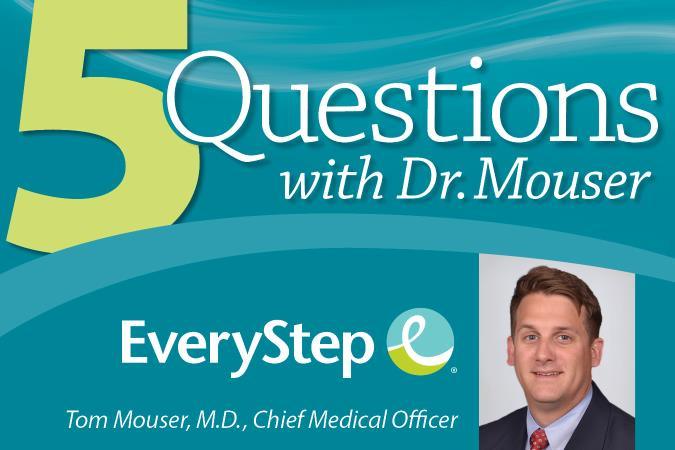March 21, 2023
When an Aging Parent Isn't Safe at Home

Millions of Baby Boomers (born 1946-1964) are taking care of their aging parents. But by 2030, the youngest Baby Boomer will be 65 and that responsibility will shift to Gen X (born 1965-1980) and millennials (born 1981-1996). Though an AARP survey found 77% of Americans aged 50 and older want to stay in their own homes, sometimes that’s not safe. We asked Dr. Mouser, EveryStep Chief Medical Director, when you and your parent should consider a nursing home or other senior living options.
1. What are some of the signals that your parent may no longer be safe in their home?
Dr. Mouser: It’s important to think about potential hazards and how your parent would address them. Are there stairs in or outside the home? Is your parent on medications that may make them dizzy or tired? Try to identify worst-case scenarios and how your parent would address them. You’ll also want to be aware of changes in your parent’s health or abilities. For instance, one big concern is falls. What happens if a parent lives alone and falls, breaking a bone or hitting their head and they can’t get to the phone?
There are other issues to consider like poor decision-making or judgment, or changes in memory or understanding. What if they leave the stove on? If it’s a gas stove and they forget to turn on the hood fan, carbon monoxide becomes an issue, not just house fires.
The ability to drive safely also needs to be considered. When people are getting flustered over simple things, they're going to get flustered over traffic stuff, right? They're going to get flustered over merging. Suddenly, just going to get groceries becomes a safety issue.
2. It’s a difficult conversation to have with a parent who doesn’t want to leave home. How can you approach that subject with compassion?
Dr. Mouser: I think reminding them that their whole life has revolved around raising you kids and providing for you. Using your resources now for assisted living or a nursing home is still providing for the kids by providing peace of mind and lower stress from not having to worry about you.
Occasionally, you will see parents say ‘I don’t want to be a burden to my kids. I want to do this,’ and that's such a blessing and a gift.
3. What about worries over the cost of moving to an assisted living or nursing home facility?
Dr. Mouser: Nobody wants to live anywhere besides home. While you may know that moving is the best idea, your parent may think otherwise. Many seniors get frightened at the prospect of leaving home, and resent being told what to do by their children.
It’s important to have an open and honest conversation with your loved one. You may be able to bring up issues that your parent didn’t consider, like moving closer to where you live, living somewhere warmer or being closer to grandchildren. Having an open conversation with your parent lets them express their fears and give you an opportunity to address them.
It may also be helpful to take them to visit different living facilities so they can see first-hand what it looks like, what the staff is like and who else lives there.
4. What if you avoid discussing the issue in order to avoid the tension?
What often ends up happening is that you wait for the catastrophe. The hip fracture that leads to complications and then almost dying in the ICU. The whole reason you have saved your money is to maintain quality of life, and quality of life is not fighting for your life in the ICU. We often see people wait too long and they end up in a crisis.
5. When a parent is in advanced stages of dementia or Alzheimer’s, it can be emotionally difficult to visit and interact. What advice do you have for those struggling with this aspect?
Dr. Mouser: Dementia takes more from the family than we realize. It takes away your ability to have a relationship, since you're living on the memories of who they were. I often hear from families of Alzheimer’s patients who have died in hospice care that they’re losing them a second time. You lost them when you lost that relationship and you lost them again to death. It can be very distressing.
Elderly parents with dementia or Alzheimer’s need to be nurtured, even if they won't remember from moment to moment what you did. They need to be held. They need back rubs and kisses. Talking to them, even though they aren't reciprocating or remembering it's happening, benefits them. Knowing that they are receiving this kind of care, even when you can’t be there, should help you find comfort, because that is what they need most at this time of their life.
EveryStep offers a range of services and programs for Iowa adults and seniors. For more information, complete EveryStep’s confidential and commitment-free “Find Care” form to receive a phone call from EveryStep’s experts.
Dr. Thomas Mouser, MD, is chief medical director with EveryStep. He is dually board certified in internal medicine and palliative care, having completed his residency at University of Iowa – Des Moines and a fellowship at Stanford University. Dr. Mouser has spent countless hours at the bedside of those with serious illness and chronic disease. In his role, he helps hospice, home care and palliative care patients and their families navigate complex medical decisions as guided by the patient’s goals of care. Dr. Mouser’s fellowship training provided for an expertise in advanced symptom management and communication when working with those with high burdens of suffering. He is passionate about helping his patients reach their best quality of life so they can live life to the fullest.